
British Food Journal
Scope & Guideline
Advancing Knowledge in Food Science and Sustainability
Introduction
Aims and Scopes
- Food Safety and Quality Management:
Research focusing on food safety practices, consumer perceptions, and the implementation of food safety management systems to ensure the quality and safety of food products. - Sustainable Food Practices:
Investigations into sustainable agricultural practices, food waste reduction, and the impact of consumer behavior on sustainability efforts within the food supply chain. - Consumer Behavior and Preferences:
Studies analyzing consumer attitudes, preferences, and motivations regarding various food products, including organic, local, and functional foods, with a focus on how these factors influence purchasing decisions. - Food Technology and Innovation:
Exploration of technological advancements in food production and processing, including the adoption of digital tools and innovations such as blockchain and AI in the food sector. - Culinary Tourism and Food Culture:
Research examining the intersection of food, culture, and tourism, including the role of local food in shaping destination images and consumer experiences. - Nutritional and Health Aspects of Food:
Studies addressing the nutritional qualities of food products, dietary patterns, and the implications of food choices on health outcomes.
Trending and Emerging
- Digital Transformation in Food Systems:
An increasing number of studies are exploring the impact of digital tools, such as mobile applications and online food delivery platforms, on consumer behavior and food service efficiency. - Sustainable and Ethical Consumption:
Research examining the motivations behind sustainable and ethical food choices is on the rise, reflecting growing consumer awareness and demand for transparency in food sourcing. - Health and Wellness in Food Choices:
There is a notable trend towards exploring the health implications of food consumption, including the role of functional foods and dietary supplements in promoting health and preventing disease. - Food Waste Reduction Strategies:
Emerging research is focusing on innovative strategies for reducing food waste, including consumer education, technological interventions, and policy frameworks aimed at sustainability. - Culinary Innovation and Experiential Dining:
Studies investigating the intersection of culinary innovation and consumer experiences, particularly in the context of food tourism and unique dining experiences, are gaining momentum. - Consumer Engagement Through Social Media:
The influence of social media on food choices and consumer behavior is increasingly being studied, particularly how online platforms shape perceptions and preferences in the food industry.
Declining or Waning
- Traditional Food Practices:
Research on traditional food practices and their cultural significance has seen decreased attention, possibly overshadowed by the rising focus on modern dietary trends, sustainability, and health-related food innovations. - Basic Food Supply Chain Analysis:
Studies purely focused on basic supply chain mechanics without integrating sustainability or consumer behavior aspects have become less frequent, as the journal increasingly emphasizes holistic and interdisciplinary approaches. - General Food Marketing Strategies:
Research centered solely on traditional marketing strategies without considering digital transformation or consumer engagement is experiencing a decline, as the food industry shifts towards more innovative and tech-driven marketing methods. - Food Policy and Regulation:
While still relevant, research specifically focused on food policy and regulation has seen a reduction, potentially due to the growing intersection of policy with sustainability and consumer behavior, which are more actively explored. - Food Waste Quantification Techniques:
While food waste remains a critical issue, studies solely focused on quantification techniques without addressing behavioral interventions or systemic solutions have become less prevalent.
Similar Journals
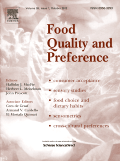
Food Quality and Preference
Advancing Research in Food Quality and Consumer PreferencesFood Quality and Preference is a leading journal in the fields of food science and nutrition, published by ELSEVIER SCI LTD. With a notable impact factor and ranking in the Q1 quartile for both food science and nutrition and dietetics in 2023, this journal consistently publishes high-quality research that explores the multifaceted aspects of food preferences, sensory evaluation, and consumer behavior. The journal provides a critical platform for researchers, professionals, and students engaged in the study of food quality, aiming to enhance our understanding of how sensory properties, nutritional value, and consumer choices intersect. Its commitment to disseminating cutting-edge findings makes it an essential resource for advancing the field and informing practice in both academic and industry settings. Access to the journal is via subscription, allowing for robust engagement with pioneering research that shapes current and future practices in food-related studies.

ITALIAN JOURNAL OF FOOD SCIENCE
Pioneering Insights in the Culinary WorldITALIAN JOURNAL OF FOOD SCIENCE is a distinguished open-access publication dedicated to advancing knowledge in the field of food science, catering to a global audience of researchers, professionals, and students. Published by Codon Publications in Singapore, this journal, operating under the ISSN 1120-1770 and E-ISSN 2239-5687, has been a vital platform for scholarly discourse since its inception in 1996, converging towards a comprehensive view of food science trends through 2024. With an impressive ranking in the third quartile (Q3) of the Food Science category and a Scopus rank of #151 out of 389, the journal plays a significant role in disseminating high-quality research, contributing to a richer understanding of food science within the agricultural and biological sciences. Since transitioning to open access in 2008, it has further expanded its reach, ensuring that innovative research is accessible to all, thereby fostering collaboration and knowledge exchange in this vital industry.
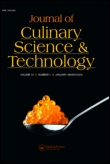
Journal of Culinary Science & Technology
Fostering insights for a dynamic culinary landscape.Journal of Culinary Science & Technology, published by Taylor & Francis Inc, is a prominent peer-reviewed journal dedicated to the interdisciplinary exploration of culinary science, bridging the gap between food production, technology, and gastronomy. Since its inception in 2006, this journal has become increasingly relevant in the field of Food Science, currently ranked Q3 evidenced by its Scopus classification within the agricultural and biological sciences category, which reflects its commitment to advancing knowledge and innovation. With a focus on research that encompasses everything from food safety to culinary trends and nutrition, the Journal of Culinary Science & Technology serves as an invaluable resource for researchers, industry professionals, and students alike, facilitating the sharing of key insights and practices crucial for the evolving culinary landscape. Although not an open-access journal, substantial contributions are made to the academic community through its noteworthy publications, fostering a deeper understanding of culinary methodologies and technologies.

Applied Food Research
Championing Innovative Processing TechniquesApplied Food Research, published by Elsevier, is an esteemed journal that plays a critical role in advancing the field of Food Science. With an ISSN of 2772-5022, the journal has established itself as a premier outlet for high-quality research, achieving a commendable Q1 ranking in the 2023 Food Science category and a 63rd percentile in Scopus rankings for Agricultural and Biological Sciences. Covering a diverse range of topics from food safety to innovative processing techniques, Applied Food Research seeks to publish pioneering studies that enhance our understanding of food systems and contribute to broader discussions on sustainability and nutrition. As it converges on its fourth year of publication, researchers, professionals, and students alike are encouraged to engage with its content through various open access options, ensuring widespread dissemination of knowledge in a field that is vital to global health and well-being. Operating out of Amsterdam, Netherlands, this journal is poised to be an indispensable resource for anyone dedicated to making significant contributions in the domain of food science.

International Journal of Gastronomy and Food Science
Advancing Knowledge at the Intersection of Gastronomy and ScienceThe International Journal of Gastronomy and Food Science, published by ELSEVIER, serves as a premier platform for scholars and practitioners in the domains of gastronomy and food science. With an ISSN of 1878-450X and E-ISSN 1878-4518, this journal has been recognized for its impact, holding a prestigious Q1 ranking in Cultural Studies and a Q2 ranking in Food Science as of 2023, thereby reflecting its influence and relevance in the field. It is particularly noted for its robust Scopus rankings, placing 28th out of 1304 in Social Sciences - Cultural Studies, advocating for high-quality research with a 97th percentile ranking, and 117th in Agricultural and Biological Sciences – Food Science with a 70th percentile ranking. This open-access journal offers a comprehensive exploration of food-related issues, aiming to bridge the gap between culinary arts and scientific research, enhancing the understanding of food systems and cultural significance. For researchers, professionals, and students alike, the International Journal of Gastronomy and Food Science is an invaluable resource, dedicated to fostering innovation and comprehensive discourse in culinary studies.
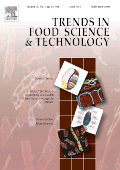
TRENDS IN FOOD SCIENCE & TECHNOLOGY
Elevating food science with cutting-edge insights.Trends in Food Science & Technology, published by Elsevier Science London, stands as a premier journal in the fields of food science and biotechnology. With an impressive Q1 ranking in both the food science and biotechnology categories, it is recognized for its rigorous peer-reviewed articles that advance knowledge and innovation in the sector. The journal’s Scopus rankings validate its significance, placing it in the top percentile among its peers, with a remarkable rank of #2 out of 389 in Agricultural and Biological Sciences - Food Science, and #4 out of 311 in Biochemistry, Genetics, and Molecular Biology - Biotechnology. Since its inception in 1990, the journal has become a vital resource for researchers, professionals, and students alike, offering insights into contemporary challenges and trends impacting food technology. Although it operates under a subscription model, the quality of research published within its pages makes it an essential read for anyone involved in advancing the science of food.

Foods
Connecting Researchers to Transform Food Systems.Foods is a premier open access journal published by MDPI, based in Switzerland, that has been at the forefront of disseminating high-quality research in the fields of food science, health professions, and plant science since its establishment in 2012. With an impressive convergence of interdisciplinary studies spanning various aspects of food, nutrition, and microbiology, the journal aims to provide a comprehensive platform for researchers and professionals to share innovative ideas and findings. Maintained as a Q1 journal in multiple categories for 2023, including Food Science and Health Professions, Foods has garnered significant recognition within the academic community, reflected in its strong Scopus rankings and percentiles across various disciplines. The journal not only promotes open access to enhance the visibility and accessibility of research but also encourages the exploration of sustainable food systems and health-related issues, thus contributing to essential discussions in today's society. For those looking to advance their understanding and expertise in food-related sciences, Foods serves as an enduring resource for groundbreaking studies and critical insights.
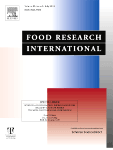
FOOD RESEARCH INTERNATIONAL
Driving Excellence in Food ResearchFOOD RESEARCH INTERNATIONAL is a premier academic journal published by ELSEVIER, specializing in the field of Food Science. With an impressive impact factor and ranked Q1 in the 2023 category quartiles, it stands at the forefront of research, positioned 17th out of 389 in the Scopus ranking for Agricultural and Biological Sciences, attaining a commendable 95th percentile. The journal publishes high-quality, peer-reviewed articles that cover a broad spectrum of topics, including food safety, quality control, nutrition, and biotechnology, making it an invaluable resource for academics, industry professionals, and students alike. As FOOD RESEARCH INTERNATIONAL seeks to enhance understanding and advance technologies related to food, it encourages innovative perspectives and interdisciplinary research. The journal, active from 1992 and continuing through 2024, is an essential platform for disseminating vital findings and fostering collaboration within the global food science community.
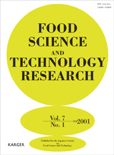
FOOD SCIENCE AND TECHNOLOGY RESEARCH
Driving Progress in Food Science and EngineeringFOOD SCIENCE AND TECHNOLOGY RESEARCH, published by the Japanese Society of Food Science & Technology, is a pivotal journal that encompasses a wide spectrum of research in the fields of food science, biotechnology, and engineering. With its ISSN number 1344-6606 and a digital counterpart E-ISSN 1881-3984, this journal aims to disseminate cutting-edge research and innovative technologies that enhance food safety, quality, and sustainability. Recognized for its contributions, it holds a Q3 category ranking in multiple disciplines, including Food Science and Biotechnology, indicating a significant role in advancing academic discourse. Researchers and professionals can benefit from its insights, as the journal covers an array of topics relevant to industrial applications, marketing strategies, and scientific advancements. Although not an open-access journal, it has a wide reach and is committed to providing high-quality, peer-reviewed content essential for scholars and practitioners in the food science community from 1999 to 2024.

Current Research in Nutrition and Food Science
Innovating food science for global well-being.Current Research in Nutrition and Food Science is a premier academic journal dedicated to advancing knowledge in the fields of nutrition and food science. Published by ENVIRO RESEARCH PUBLISHERS, this journal serves as a critical platform for researchers, professionals, and students to disseminate impactful research findings. With its Q3 ranking in both Food Science and Medicine (miscellaneous) categories for 2023, it reflects its commitment to quality and relevance within these disciplines. The journal operates under an open access model, ensuring that its content is readily available to a global audience, thus promoting collaboration and innovation across various sectors. Covering a wide range of topics from agricultural practices to the biochemical aspects of nutrition, Current Research in Nutrition and Food Science invites contributions that push the boundaries of understanding, addressing contemporary challenges in food safety, dietary health, and nutrition policies. As it continues its journey from 2013 to 2024 and beyond, the journal occupies an essential role in fostering a dialogue among scholars and practitioners, supporting the advancement of science and, ultimately, healthier global communities.